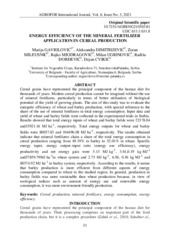Приказ основних података о документу
Energy efficiency of the mineral fertilizer application in cereal production
| dc.creator | Gavrilović, Marija | |
| dc.creator | Dimitrijević, Aleksandra | |
| dc.creator | Mileusnić, Zoran | |
| dc.creator | Miodragović, Rajko | |
| dc.creator | Ugrinović, Milan | |
| dc.creator | Đorđević, Radiša | |
| dc.creator | Cvikić, Dejan | |
| dc.date.accessioned | 2021-12-29T17:50:14Z | |
| dc.date.available | 2021-12-29T17:50:14Z | |
| dc.date.issued | 2021 | |
| dc.identifier.issn | 2490-3434 | |
| dc.identifier.uri | http://RIVeC.institut-palanka.rs/handle/123456789/459 | |
| dc.description.abstract | Cereal grains have represented the principal component of the human diet for thousands of years. Modern cereal production can not be imagined without the use of mineral fertilizers, particularly in terms of better utilization of biological potential of the yield of growing plants. The aim of this study was to evaluate the energetic efficiency of wheat and barley production, with special reference to the share of the use of mineral fertilizers in total energy consumption. Input data and yield of wheat and barley fields were collected in the experimental trials in Serbia. Results showed that total energy inputs of wheat and barley fields were 22178.04and15921.16 MJ·ha-1, respectively. Total energy outputs for wheat and barley fields were 80037.83 and 104496.08 MJ·ha-1,respectively. The results obtained indicate that mineral fertilizers claim a share of the total energy consumption in cereal production ranging from 49.19% in barley to 52.01% in wheat. Specific energy input, energy output–input ratio (energy use efficiency), energy productivity and net energy gain were 5.13 MJ·kg-1, 3.61,0.19 kg·MJ-1and57859.79MJ·ha-1in wheat system and 2.75 MJ·kg-1, 6.56, 0.36 kg·MJ-1and88574.92 MJ·ha-1in barley system, respectively. According to the results, it seems that barley production is more efficient from different aspects of energy consumption compared to wheat in the studied region. In general, production in barley fields was more sustainable than wheat production because, in view of ecological indices such as amount of energy use and renewable energy consumption, it was more environment-friendly production. | sr |
| dc.language.iso | en | sr |
| dc.publisher | Faculty of Agriculture, University of East Sarajevo | sr |
| dc.relation | info:eu-repo/grantAgreement/MESTD/inst-2020/200216/RS// | sr |
| dc.rights | openAccess | sr |
| dc.source | AGROFOR International Journal | sr |
| dc.subject | cereal production | sr |
| dc.subject | mineral fertilizers | sr |
| dc.subject | energy consumption | sr |
| dc.subject | energy efficiency | sr |
| dc.title | Energy efficiency of the mineral fertilizer application in cereal production | sr |
| dc.type | article | sr |
| dc.rights.license | ARR | sr |
| dc.citation.epage | 37 | |
| dc.citation.issue | 3 | |
| dc.citation.spage | 31 | |
| dc.citation.volume | 6 | |
| dc.identifier.fulltext | http://RIVeC.institut-palanka.rs/bitstream/id/1377/bitstream_1377.pdf | |
| dc.identifier.rcub | https://hdl.handle.net/21.15107/rcub_rivec_459 | |
| dc.type.version | publishedVersion | sr |


